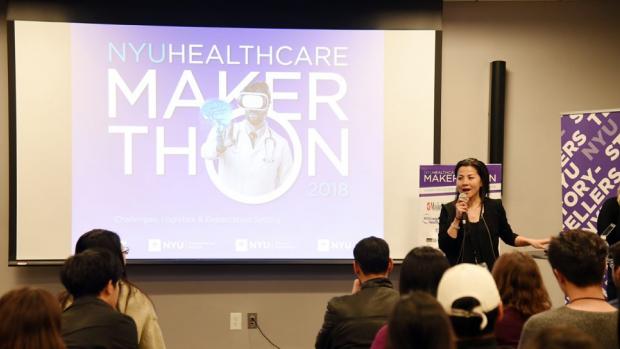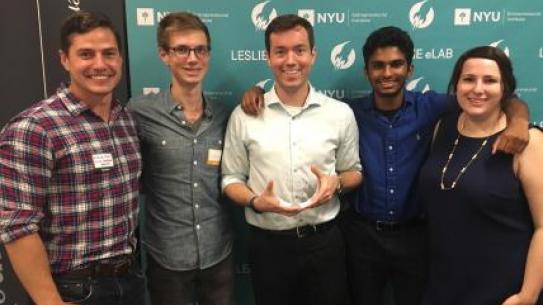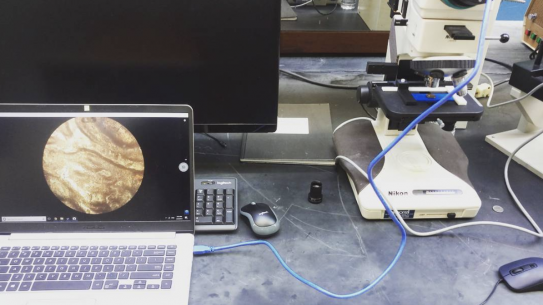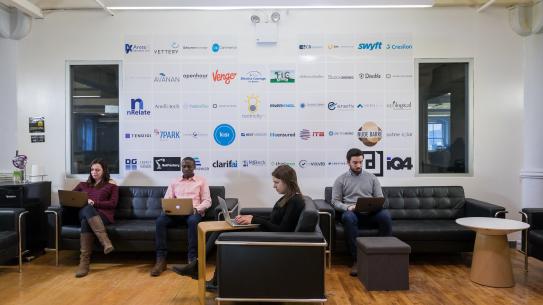From Lab Bench to Bedside: Helping Medical Innovators at Every Stage

The 4th annual NYU Healthcare Makerthon brought together NYU students, faculty, and staff in an effort to solve some of healthcare’s most pressing challenges.
Translational research — the process of translating advances made in the lab into new tools, techniques, and therapies for patient care — is often referred to by the catchy phrase “bench to bedside.” In the case of NYU Tandon, a better phrase might be “brain to bedside,” since the school is devoted to supporting medical innovation every step of the way.
Whether it’s the efforts of the high-profile researchers in our Department of Biomedical Engineering or an idea that occurs to a motivated first-year student during an intro course, every day members of the NYU Tandon community are doing work with the potential to improve human health.
This Could Be the Start of Something Big
Each year, the University holds a weekend-long Healthcare Makerthon, calling upon students to form multidisciplinary teams to address unmet needs in the realm of healthcare. Tandon’s students are always in great demand when teams are formed, and during the last Makerthon event, they helped develop apps to guide patients who had undergone hip surgery through their physical therapy exercises, assist home health aides with managing care for the elderly, empower seniors to connect with companions, and more.
A New Generation of Medical Entrepreneurs
The NYU Entrepreneurial Institute has a wide array of initiatives aimed at helping students gain a foothold in New York City’s entrepreneurial ecosystem. This past January, for example, during J-Term, as the period between Fall and Spring Terms is called, groups of ambitious students tried getting businesses off the ground, thanks to the J-Term Startup Sprint, an intensive program that taught them to conduct customer discovery and hone their ideas. Some of the participants had met during the Makerthon and continued those partnerships to advance their ideas towards commercialization.
For that physical therapy app, which its creators dubbed Highline, for example, Tandon graduate student Kanishk Gandhi teamed up with students from the NYU College of Arts and Science; the developers of Synchealth, a platform aimed at helping mental-health patients manage their care, included Alexis Trevizo from Tandon and teammates from the School of Medicine and Courant.
“Our Startup Sprint is a two-week customer development intensive to help startup teams reach problem-solution fit, while our Summer Launchpad program is a nine-week mentorship and skills building accelerator to help startups gain market traction,” Carol Ourivio of the Entrepreneurial Institute explains. “The Launchpad is highly competitive so we encourage teams to participate in one of our shorter accelerator programs like the Sprints so they have the foundation they need before applying. That has the added benefit of allowing us to get to know the teams beforehand as well."
The Heat Is On
Aspiring medical entrepreneurs at NYU can also choose to compete in a variety of competitions, including Tandon’s annual InnoVention, which provides 12 student-led ventures with workshops, coaching, community, perks, legal services, and an opportunity to win up to $50,000.
The last cohort included HealthHuddle, a platform for hospitals that integrates and displays vital patient information for nurses and quality improvement teams co-founded by Tandon student Andrew Dempsey; and Sensahead, a compact and low-cost first aid sensor for the same day detection of mild traumatic brain injury whose co-founders include Tandon students Shayam Parasram and Olivia Patton.

HealthHuddle, which had already won the Fall 2017 Healthcare Makerthon and the Spring 2018 NYU Mobile App Competition and had taken part in the 2018 Summer Launchpad, finished InnoVention in second place, placing them in good company. InnoVention winners and finalists often go on to commercialize their products as well-funded start-ups, with some — like Cresilon, makers of a gel that can stop profuse bleeding in seconds, and Mana Health, developers of a simple yet efficient portal for patients and practitioners — gaining tenancy in Tandon’s Future Labs, a thriving network of entrepreneurial hubs dedicated to incubating and accelerating promising businesses.
The Future Is Entrepreneurial
While Cresilon and Mana Health both graduated from the Future Labs in 2013, moving on to their own office space and new challenges, Tandon’s startup hubs are still home to several booming companies operating in the sphere of medicine and healthcare.
Among them is Alexapath, which has developed the world’s first AI ready light microscope. Founded by Lou Auguste, a film producer-turned-tech-entrepreneur, the company recently joined forces with researchers from the National Autonomous University of Mexico (UNAM) on a project to detect parasitic worms, known as Helminthes, in water. (Hookworms and roundworms are among the most well-known varieties.)
“We were lucky enough to be introduced to Catalina Maya Rendon, a lead researcher in the lab of Blanca Jiménez Cisneros, who is widely considered to be one of the world’s foremost authorities on the removal of micro-organisms from wastewater,” Auguste says. “They had trained an artificially intelligent system to identify Helminth ova and determine whether they were alive or dead. They had been unable to prototype a microscope capable of working with the AI, however, which is where Alexapath came in.”
With the support of the Bill and Melinda Gates Foundation, Auguste and his colleagues are now preparing to field test the Artificial Intelligence Diagnosis and Analysis (AiDA 2) microscope at a series of wastewater treatment plants. “Many countries use wastewater, also known as gray water, for irrigation,” he explains. “So you can see how it would be a problem if that water was contaminated with viable Helminth ova; the parasites could end up directly on crops to be ingested by consumers, or barefoot workers could become infected that way.”

The World Health Organization, which estimates that one billion people globally are now infected, has set guidelines for wastewater use at no more than one Helminth ovum per liter for irrigation purposes. The organization has the ambitious goal of eradicating the scourge entirely, making Alexapath’s microscope of enormous interest around the world.
Another current Future Labs tenant is Medivis, whose mission is to leverage augmented reality and artificial intelligence to improve surgical safety and precision. The company is reaching medical students through a holographic education platform focused on lessons in anatomy and is also developing SurgicalAR, a holographic visualization platform being employed right now for pre-surgical planning and research purposes.
“I think it comes as a surprise to some people how much guesswork is still going on in surgery. Even things like: how do we ideally position the patient? Where do we make an incision; how big is the incision? Where is this vessel that we need to be mindful of?” co-founder Christopher Morley, a radiologist, told one journalist. “These questions are typically answered by scrolling through two-dimensional devices, reconstructing that information in your mind’s eye, so to speak. And then using your working memory while you’re preparing for and doing these surgeries.” He continued, “Now we’re trying to use AI to alleviate that entire gap that exists in cognitive understanding and actionability of information. We are building a platform that will allow people to [actually] see stuff instead of having to imagine it.” (The company has collaborated with another Future Labs tenant, Paperspace, developers of a platform that provides access to limitless cloud computing resources on any device.)
The benefits of being at the Future Labs — whose tenants also include Hikmah Tech, makers of at-home kits for the detection of sexually transmitted diseases and infections — are far-reaching, with access to not just office space, but pro-bono legal help, potential sources of venture capital, subject-specific expertise from Tandon faculty members, and a ready pool of talented student interns.
With Tandon researchers working at the intersection of engineering and healthcare to discover powerful new treatments and medical devices, develop methods to deliver care to underserved communities, create assistive technology to increase accessibility for all, and find ways to make the world’s population a healthier one, it’s no surprise that the school’s entrepreneurial community is right there pitching in to meet those goals.





